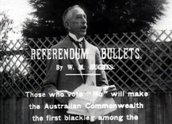
Australian Labor Government 1916 Conscription Referendum Campaign: Referendum Bullets (1916)
Synopsis
This is a silent cinema short presented by the then Prime Minister, Billy Hughes, promoting the ‘Yes’ vote for the 1916 conscription referendum.
Curator’s notes
This film is one of a collection of historical campaign films held at the NFSA on behalf of the Australian Labor Party.
On 28 October 1916, Australians voted in a referendum on the question of conscription. Military training for Australian men over 18 years of age had been compulsory since 1911, but there was no compulsion to enlist for duty when the First World War broke out in 1914. Initially, many Australian troops volunteered readily for service abroad. However as the war continued with no end in sight, and the growing numbers of Australian casualties on the Western Front became public knowledge, there was a dramatic fall in volunteers. Extensive advertising campaigns failed to change the trend. The Prime Minister, William Morris Hughes, was a strong proponent of Australia’s participation in the war. In 1916 he travelled to Britain and France, and visited Australian troops on the front line. He became convinced that conscription was necessary.
While the bulk of his party – the then 25-year-old Labor Party – was opposed to conscription, Hughes pushed ahead with the idea. He argued the case for a referendum to be held, which he believed would reveal majority support by the nation. The referendum question sought an agreement to the proposal that men undergoing compulsory military training would then be required to serve overseas. The referendum was narrowly defeated, with 1,087,557 in favour and 1,160,033 against. Hughes’ campaign produced a bitter split within the community as well as within the Labor Party, and affected party allegiances in Australia for decades. Hughes and his supporters were expelled from the Labor Party. However they were able to regroup to form a ‘National Labor Party’ with sufficient numbers in the House of Representatives to retain government.
One of those who led the fight against conscription was the newly appointed Catholic Archbishop of Melbourne, Dr Daniel Mannix. In 1962 Gerald Lyons of the ABC did a lengthy interview with the then 97-year-old Mannix, in a program entitled Interview with Archbishop Mannix.
- Overview
- Curator’s notes
- Video 1 clip
- Principal credits
- Find a copy
- Make a comment
- Add your review



